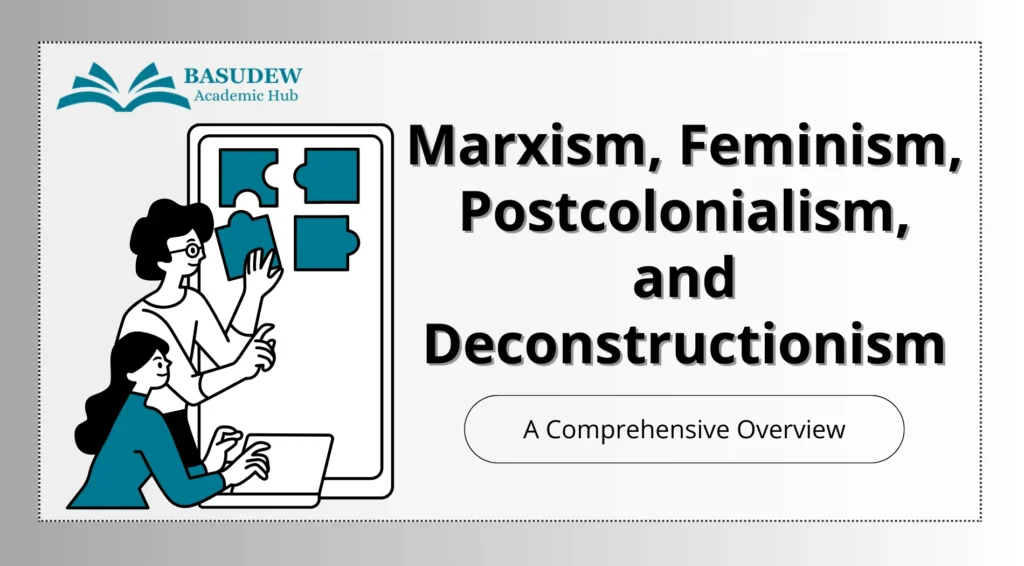In contemporary critical theory, Marxism, Feminism, Postcolonialism, and Deconstructionism represent four foundational frameworks used to understand power dynamics, social structures, and cultural transformations. Each of these theories provides unique perspectives on the relationships between individuals, society, and knowledge. By examining their key ideas and intersections, we gain a deeper insight into how these schools of thought shape modern politics, social movements, and academic disciplines.
1. Marxism: Class Struggle and Economic Determinism
Marxism is a socio-economic and political theory developed by Karl Marx and Friedrich Engels. It seeks to understand the dynamics of class struggle, the modes of production, and the relationships between labor, capital, and power. Rooted in materialism, Marxism critiques capitalism by analyzing its inherent contradictions and proposing socialism as a path toward a classless society.
Core Principles:
- Historical Materialism: Marxism posits that economic structures shape societal development. It emphasizes the importance of the material conditions of life, arguing that history is driven by class struggles and the evolution of modes of production.
- Class Struggle: Society is divided into classes based on their relationship to the means of production. The bourgeoisie (owners of production) exploits the proletariat (working class), leading to inherent tensions.
- Surplus Value and Exploitation: Marx argued that labor produces value, but capitalists appropriate surplus value, creating economic inequality.
- Alienation: In capitalist societies, workers are alienated from their labor, the products they create, and their true selves, as they become mere cogs in the industrial machinery.
- Revolutionary Change: Marxism envisions the proletariat overthrowing the bourgeoisie through a revolution, leading to a socialist state and eventually a stateless, classless society.
Marxism in Literature and Culture:
Marxist literary theory examines how texts reflect, reinforce, or challenge social and economic inequalities. It critiques ideologies perpetuated by literature and explores the relationship between base (economy) and superstructure (culture, ideology, and institutions). Marxist critics, such as Georg Lukács, Terry Eagleton, and Fredric Jameson, analyze works for themes of class struggle, material conditions, and ideological control.
Contemporary Relevance:
Marxism remains a foundational framework for analyzing global capitalism, labor rights, and economic inequalities. It informs modern movements for social justice and critiques of neoliberalism and globalization.
2. Feminism: Gender Equality and Social Liberation
Feminism is a movement and theoretical framework advocating for gender equality and challenging patriarchal structures. It interrogates how gender intersects with race, class, sexuality, and other axes of identity to perpetuate oppression and inequality.
Waves of Feminism:
- First Wave (19th–20th Century): Focused on legal issues such as women’s suffrage, property rights, and education.
- Second Wave (1960s–1980s): Addressed broader issues, including workplace discrimination, reproductive rights, and the patriarchy’s pervasive influence on culture and society.
- Third Wave (1990s–2010s): Emphasized intersectionality, embracing diverse experiences of women and challenging essentialist notions of gender.
- Fourth Wave (2010s–present): Centers on digital activism, #MeToo movement, and issues like sexual harassment and body positivity.
Feminism in Literature:
Feminist literary criticism explores how texts reinforce or subvert patriarchal norms. Key areas of focus include:
- Representation of women and gender roles.
- Female authorship and the “silencing” of women in literary history.
- The gaze and its implications for power and agency.
Notable feminist theorists like Simone de Beauvoir, bell hooks, Judith Butler, and Gayatri Spivak have enriched the discourse, examining themes like gender performativity, intersectionality, and the colonization of women’s bodies and identities.
Feminism and Intersectionality:
Coined by Kimberlé Crenshaw, intersectionality underscores how overlapping identities, such as race, class, and gender, create unique experiences of oppression. This approach has broadened feminist activism to address global inequalities, LGBTQ+ rights, and colonial legacies.
3. Postcolonialism: Decolonizing the Mind and World
Postcolonialism examines the cultural, political, and economic legacies of colonialism and imperialism. It seeks to understand how colonized societies have been shaped by and resisted colonial domination, and how these experiences influence identity, culture, and power dynamics.
Key Themes:
- Colonial Discourse: Colonizers often justified domination through narratives of racial and cultural superiority. Postcolonial theory critiques these narratives and their lingering effects on global hierarchies.
- Hybridity: Coined by Homi Bhabha, hybridity explores the fusion and tension between colonized and colonizer cultures. It highlights the complexities of identity in postcolonial contexts.
- Othering: Postcolonial theorists analyze how the West constructed the “Orient” as the exotic and inferior Other to justify subjugation. Edward Said’s Orientalism is foundational in this regard.
- Subaltern Studies: Inspired by Antonio Gramsci, subaltern studies focus on marginalized voices and histories that have been suppressed by dominant colonial narratives. Gayatri Spivak’s essay Can the Subaltern Speak? critiques the erasure of these voices.
- Decolonization: Postcolonialism emphasizes the ongoing struggle for cultural and economic autonomy and critiques neo-colonial practices perpetuated by globalization.
Postcolonial Literature:
Postcolonial writers like Chinua Achebe, Salman Rushdie, Arundhati Roy, and Ngũgĩ wa Thiong’o depict the experiences of colonization and its aftermath. Their works interrogate identity, language, and resistance, offering a critique of imperial legacies and envisioning alternative futures.
Relevance:
Postcolonialism is crucial in understanding global inequalities, cultural hegemony, and the persistence of colonial ideologies in international relations, trade, and education.
4. Deconstructionism: Questioning Truth and Meaning
Deconstruction, associated with Jacques Derrida, is a poststructuralist approach to analyzing texts, ideas, and systems. It challenges the assumption of fixed meanings, binary oppositions, and hierarchical structures in language and thought.
Core Concepts:
- Différance: Derrida’s concept of différance suggests that meaning is always deferred and relational. Words acquire meaning not through inherent essence but through their differences from other words.
- Logocentrism: Western thought privileges “logos” (reason or truth) as central and stable. Deconstruction interrogates this privileging, exposing its inconsistencies and assumptions.
- Binary Oppositions: Deconstruction dismantles hierarchical binaries (e.g., male/female, reason/emotion) to reveal their interdependence and instability.
- Textuality: All meaning is textual and contingent, shaped by interpretation and context. Deconstruction destabilizes texts to uncover multiple, often contradictory meanings.
Deconstruction in Literature and Philosophy:
Deconstructionist criticism examines how literary texts undermine their apparent meanings, revealing ambiguities and contradictions. It challenges the authorial intent and emphasizes the reader’s role in creating meaning.
Derrida’s ideas have influenced diverse fields, from philosophy and law to architecture and political theory. In literature, critics like Paul de Man and J. Hillis Miller have applied deconstruction to canonical texts, uncovering their complexities and problematizing traditional interpretations.
Criticisms and Impact:
Critics of deconstruction argue that its emphasis on indeterminacy can lead to relativism and nihilism. However, its impact on postmodern thought is profound, encouraging skepticism of grand narratives and fostering a critical approach to language, power, and meaning.
Intersections and Relevance:
While distinct, Marxism, feminism, postcolonialism, and deconstructionism often intersect, offering complementary insights into power, identity, and resistance. For instance:
- Marxism and Postcolonialism: Both critique global inequalities and the exploitation of marginalized groups, though Marxism emphasizes class and postcolonialism highlights cultural and racial dimensions.
- Feminism and Postcolonialism: Both frameworks interrogate how gender and colonial histories shape identity and oppression, with intersectionality serving as a bridge.
- Deconstruction and Feminism/Postcolonialism: Deconstruction’s focus on dismantling binaries and hierarchies enriches feminist and postcolonial critiques of patriarchy and imperialism.
These theories remain vital tools for understanding and challenging contemporary structures of power, inspiring movements for justice, equality, and liberation across diverse contexts.




